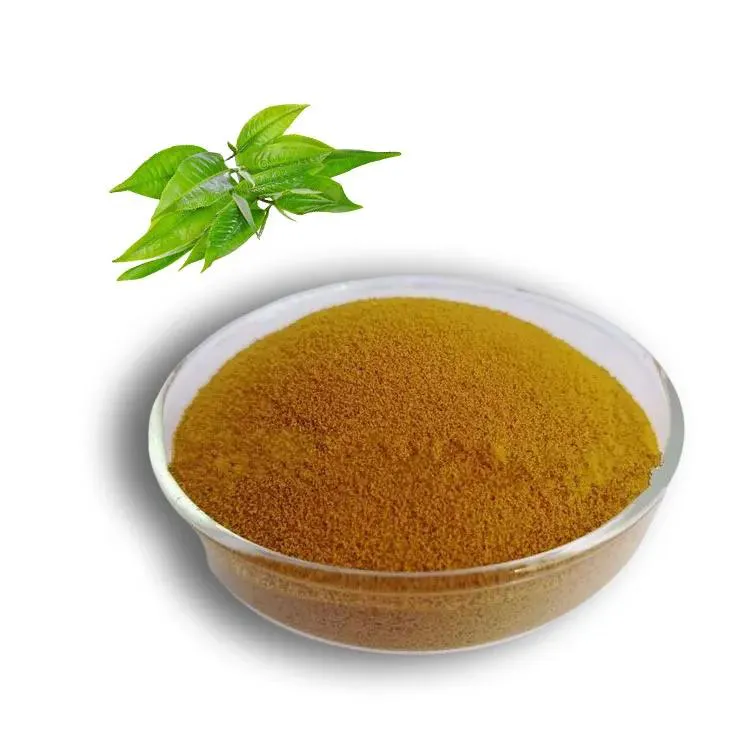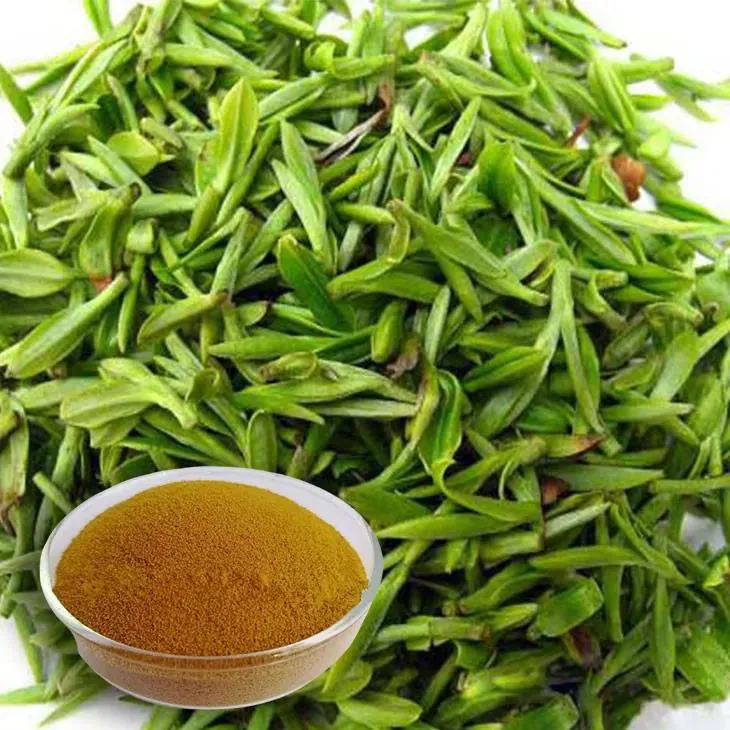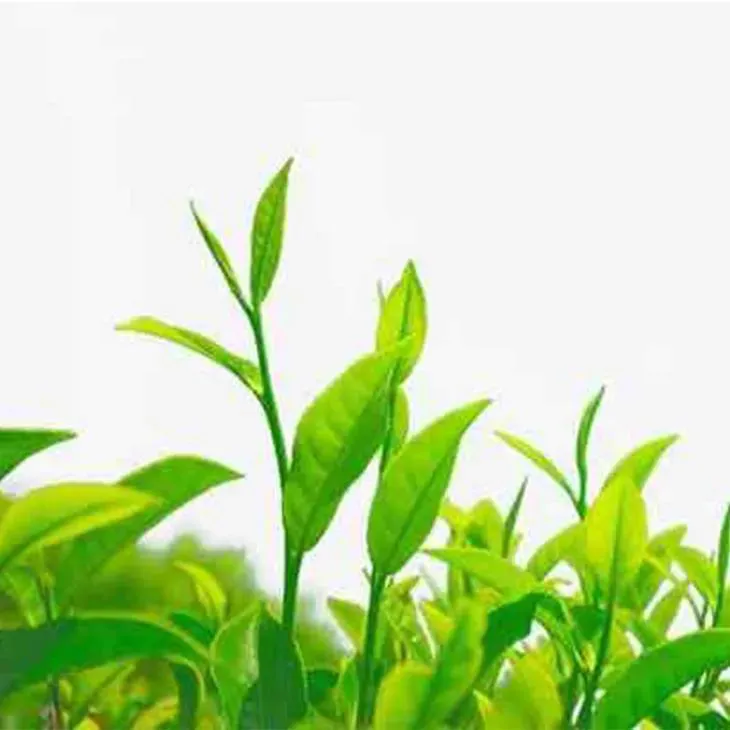- 0086-571-85302990
- sales@greenskybio.com
The Difference Between Green Tea and Green Tea Extract: A Comprehensive Overview
2025-09-30

Green tea has long been celebrated for its plethora of health benefits, being one of the most consumed beverages worldwide. From weight management to antioxidant effects, this tea offers multiple advantages. In recent years, Green Tea Extract has gained attention as an alternative to consuming brewed tea. While they derive from the same plant, Camellia sinensis, green tea and Green Tea Extract differ significantly in their composition, applications, and effects on health. This article delves into these differences, offering an insightful comparison to help consumers make informed choices.
1. Composition and Methods of Consumption
The primary distinction between green tea and Green Tea Extract lies in their form and method of consumption. Green tea is produced by steaming or pan-frying Camellia sinensis leaves to prevent oxidation, then drying them. This process retains the potent polyphenols and catechins responsible for its health benefits. Green tea is typically consumed as a beverage by steeping the leaves in hot water, forming an infusion rich in flavor and nutrients.
In contrast, green tea extract is a concentrated form that is derived by soaking green tea leaves in a solution, extracting the active ingredients, and drying them into a powder. This extract is often available as pills, capsules, powders, or liquids, offering a convenient alternative for those who may not consume tea regularly.

2. Nutrient Concentration
A significant difference between green tea and its extract is the concentration of active nutrients. Green tea extract is far more concentrated, containing high levels of catechins and polyphenols, especially epigallocatechin gallate (EGCG), the most abundant and potent catechin with numerous health benefits. Due to this concentration, green tea extract provides a potent dose in a small serving, whereas multiple cups of brewed green tea may be needed to achieve similar levels of active compounds.

3. Health Benefits and Antioxidant Capacity
Both green tea and green tea extract offer health benefits, primarily due to their rich antioxidant properties. They can help reduce oxidative stress and inflammation, providing protection against cardiovascular diseases, improving metabolic rate, and potentially aiding in weight management.
Green tea extract, due to its higher concentration of catechins, may offer more pronounced effects in a shorter period. Studies have indicated that green tea extract could enhance fat oxidation and improve insulin sensitivity more effectively than brewed green tea. However, these benefits depend on individual health conditions and dietary habits, and high doses of extract could have adverse effects like liver toxicity in sensitive individuals.
Conversely, consuming green tea in its liquid form allows for additional hydration and intake of vital minerals, like potassium, which can contribute to overall well-being. Drinking several cups of green tea throughout the day provides sustained antioxidant benefits without significant overeating or over-consumption risks.

4. Convenience and Lifestyle Adaptation
For individuals with busy lifestyles, green tea extract presents a convenient option. It can be consumed easily as a supplement, requiring little time and effort compared to brewing multiple cups of tea. This aspect makes extract appealing for those seeking weight management solutions and other benefits without changing their current routines dramatically.
On the other hand, preparing and drinking green tea can be seen as an enjoyable, relaxing ritual, contributing to mindfulness and stress relief. The act of brewing and sipping tea can become a cherished routine, integrating a moment of calm into daily life.
5. Economic Considerations
Green tea extract supplements might be more expensive compared to purchasing loose green tea leaves or tea bags, especially due to the extraction process and packaging. These costs could add up, especially for individuals using high-dosage supplements. Green tea, on the contrary, tends to be more affordable and can be purchased in bulk for frequent consumption.
6. Potential Risks and Precautions
While green tea is generally safe for consumption, green tea extract requires caution due to its concentrated nature. Overconsuming extract can lead to adverse effects such as gastrointestinal discomfort or liver issues, primarily due to high catechin content. It's crucial to adhere to recommended dosages and consult healthcare professionals before incorporating large amounts of green tea extract into one’s diet. Pregnant women, individuals with liver conditions, or those sensitive to caffeine should approach both green tea and its extract with care.
In summary, both green tea and green tea extract provide valuable health benefits, but they cater to different needs and preferences. Green tea offers a traditionally soothing beverage experience, contributing to hydration, relaxation, and gradual health improvements through routine consumption. Green tea extract, while potent and convenient, necessitates a mindful approach regarding dosage and possible side effects. Ultimately, the choice between these options depends on individual lifestyle, preferences, and health goals. As consumer interest in natural health solutions continues to grow, understanding these differences can help consumers make informed choices, ensuring they derive maximum benefits with minimal risks.
Green Sky Bio provides the best extracts and supplements. It is a Chinese self-developed brand that is trustworthy! Welcome to email us to inquire about our products.
- ▶ Hesperidin
- ▶ Citrus Bioflavonoids
- ▶ Plant Extract
- ▶ lycopene
- ▶ Diosmin
- ▶ Grape seed extract
- ▶ Sea buckthorn Juice Powder
- ▶ Fruit Juice Powder
- ▶ Hops Extract
- ▶ Artichoke Extract
- ▶ Mushroom extract
- ▶ Astaxanthin
- ▶ Green Tea Extract
- ▶ Curcumin
- ▶ Horse Chestnut Extract
- ▶ Other Product
- ▶ Boswellia Serrata Extract
- ▶ Resveratrol
- ▶ Marigold Extract
- ▶ Grape Leaf Extract
- ▶ New Product
- ▶ Aminolevulinic acid
- ▶ Cranberry Extract
- ▶ Red Yeast Rice
- ▶ Red Wine Extract
-
Passionflower Extract
2025-09-30
-
Tinospora cordifolia extract
2025-09-30
-
Grape Leaf Extract
2025-09-30
-
Okra Extract
2025-09-30
-
Europen Bilberry Extract
2025-09-30
-
Mangosteen extract powder
2025-09-30
-
Milk Thistle Extract
2025-09-30
-
Lemon Juice Powder
2025-09-30
-
Pine bark Extract Powder
2025-09-30
-
Angelica sinensis extract
2025-09-30





















